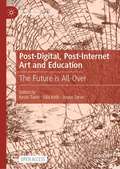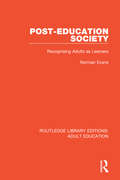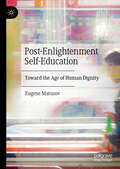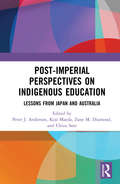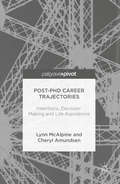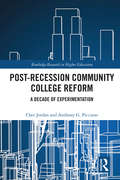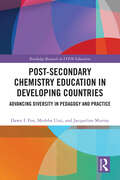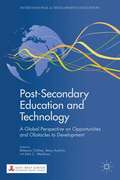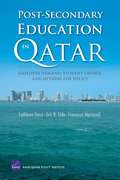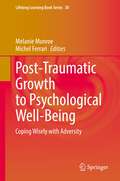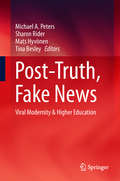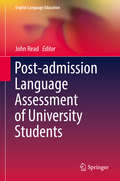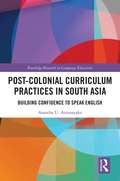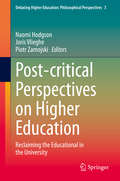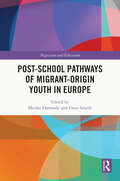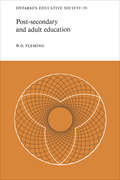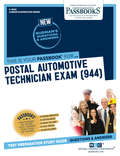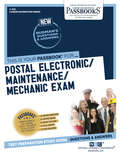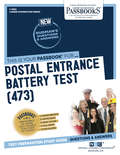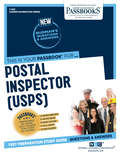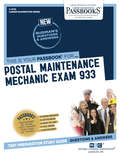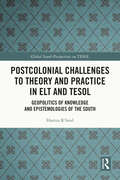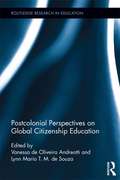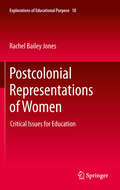- Table View
- List View
Post-Digital, Post-Internet Art and Education: The Future is All-Over (Palgrave Studies in Educational Futures)
by Kevin Tavin Gila Kolb Juuso TervoThis open access edited volume provides theoretical, practical, and historical perspectives on art and education in a post-digital, post-internet era. Recently, these terms have been attached to artworks, artists, exhibitions, and educational practices that deal with the relationships between online and offline, digital and physical, and material and immaterial. By taking the current socio-technological conditions of the post-digital and the post-internet seriously, contributors challenge fixed narratives and field-specific ownership of these terms, as well as explore their potential and possible shortcomings when discussing art and education. Chapters also recognize historical forebears of digital art and education while critically assessing art, media, and other realms of engagement. This book encourages readers to explore what kind of educational futures might a post-digital, post-internet era engender.
Post-Education Society: Recognising Adults as Learners (Routledge Library Editions: Adult Education)
by Norman EvansOriginally published in 1985, this book argues that to make sense any attempt to improve the situation must take account of what we now know about adult growth and development, accepting as an operational imperative that it is as problematic and turbulent as childhood. The book claims that since adults flourish to the extent that they have a sense of personal recognition, the business of education is to enable people to gain that sense of being recognised and valued through any learning they undertake. It suggests that putting adults in charge of their own learning is the logical extension of establishing a public education system and so is a necessary step towards our society becoming a democracy of learners. This important book marked a watershed in the literature on adult and continuing education.
Post-Enlightenment Self-Education: Toward the Age of Human Dignity
by Eugene MatusovThe book aims to challenge and redefine the traditional Enlightenment approach to education by advocating for a Post-Enlightenment model that emphasizes self-education rooted in individual autonomy, dignity, and diverse experiences. It critiques the Enlightenment's narrow focus on rationality and hierarchy, proposing a more inclusive and personalized method that values emotional intelligence and contextual understanding. The book seeks to promote a radical shift towards educational pluralism, where learning is driven by the learner's own needs, interests, and judgments, rather than imposed by external authorities. Ultimately, it calls for a reimagined educational paradigm that aligns with the principles of universal human dignity and autonomy, envisioning a future where education is a personal and existential pursuit supported by democratic societal structures.
Post-Imperial Perspectives on Indigenous Education: Lessons from Japan and Australia
by Peter J. Anderson Chizu Sato Zane M. Diamond Koji MaedaThis book explores the impact of the United Nations Declaration on the Rights of Indigenous Peoples in Japan and Australia, where it has heralded change in the rights of Indigenous Peoples to have their histories, cultures, and lifeways taught in culturally appropriate and respectful ways in mainstream education systems.The book examines the impact of imposed education on Indigenous Peoples’ pre-existing education values and systems, considers emergent approaches towards Indigenous education in the post-imperial context of migration, and critiques certain professional development, assessment, pedagogical approaches and curriculum developments.This book will be of great interest to researchers and lecturers of education specialising in Indigenous Education, as well as postgraduate students of education and teachers specialising in Indigenous Education.
Post-PhD Career Trajectories
by Lynn Mcalpine Cheryl AmundsenThis book argues that post-PhD career planning should ideally begin at the same time as the PhD itself. Drawing from ten years of research and stories of close to 50 individuals, each chapter focuses on the stories of individuals who share common career intentions and how they negotiate these both before, during and after their studies. Each career trajectory is different as individuals planned and made decisions in the face of both expected and unexpected work, personal experiences and responsibilities. The book concludes with resources to help those who are currently planning or reflecting on their own career trajectories.
Post-Recession Community College Reform: A Decade of Experimentation (Routledge Research in Higher Education)
by Chet Jordan Anthony PiccianoThe book analyses and evaluates several key community college reform programs that emerged after the Recession of 2008 and as a result of major initiatives in California, New York, Tennessee, Florida, Connecticut and Wisconsin. Because of the economic downturn in the early 21st Century, an already eroding financial base for public higher education saw even further losses. At the same time, enrollments were booming, particularly in the two-year sector where many students who would have traditionally forgone a college education, were now enrolling to ensure their competitiveness in a harsh labor market. Chapters in this book examine the development and implementation of initiatives and accountability measures imposed across the states by the Obama administration, and consider their effectiveness in reducing the impact of the loss of students, and their role in improving courses. This book will be of interest to postgraduates and researchers exploring the history of education in the United States, as well as academic administrators, faculty, and policy-makers with an interest in reform-based practices that have been successfully implemented in community colleges.
Post-School Education (Routledge Revivals)
by Michael D. Stephens Gordon W RoderickFirst published in 1984, Post-School Education attempts to compare development of post-school education in America and England in nineteenth century. Divided into eight chapters, it discusses themes like traditions and attitudes; systems of school education; middle class initiatives prior to 1850; educational provision for adults in the 19th century; the growth of technical education; the development of university education; and the role of government, to showcase the extent to which England influenced America and differences between the two experiences. This book is an essential read for scholars and researchers of history of education, American education, British education and education in general.
Post-Secondary Chemistry Education in Developing Countries: Advancing Diversity in Pedagogy and Practice (Routledge Research in STEM Education)
by Jacqueline Murray Dawn I. Fox Medeba UzziThis book considers how post-secondary chemistry education can be advanced in developing countries, in order to respond to emerging global, regional, and local needs.Taking Guyana as a case study, it pays particular attention to local challenges facing such territories, including human and financial resource shortages, tension between quality and quantity of graduates, cultural inequalities, unequal access to increasingly important Information and Communication Technology or Technologies (ICTs), and increasing competition from international universities in the developed world. Written by a team with over 70 years in combined teaching experience, it asks whether these challenges can be met and overcome and considers how tertiary chemistry education can better meet the rapidly changing needs of society. The authors examine the status quo of tertiary chemistry education in Guyana against the introductory backdrop of the internal and external stresses on the education system, before exploring selected best practices grounded in a three-pronged model focused on pedagogy, programming, and people. Advancing diversity on each of these levels, the book ultimately shows how this framework can support better learning and teaching, and the development of a better equipped and more diverse Science, Technology, Engineering and Mathematics (STEM) workforce.It will appeal to scholars, researchers, graduate students, and tertiary level curriculum developers in chemistry education, interested in an innovative, holistic approach for transforming chemistry teaching that focuses on pedagogical diversity, strategic co-curricular programming, and accommodating diversity and diverse learning styles in the classroom.
Post-Secondary Education and Technology
by Rebecca Clothey Stacy Austin-Li John C. WeidmanAs the global commitment to educational access has become enshrined in all levels of society, new technologies have also been developed that hold tremendous promise for enabling these goals. This book looks at trends and challenges for expanding access to post-secondary education via technology through a set of case studies and analyses.
Post-Secondary Education in Qatar: Employer Demand, Student Choice, and Options for Policy
by Louay Constant Charles A. Goldman Cathleen Stasz Eric R. Eide Paco MartorellThe government of Qatar has made significant investments in post-secondary education to ensure that Qataris are able to contribute to the country's social and economic goals. The authors describe RAND's analysis of occupational demand and related post-secondary educational opportunities, and offer recommendations for improving the country's current provision of post-secondary education.
Post-Traumatic Growth to Psychological Well-Being: Coping Wisely with Adversity (Lifelong Learning Book Series #30)
by Michel Ferrari Melanie MunroeThis book explores 'why some people experience post-traumatic growth leading to greater wisdom and others do not’ and suggests that a critical variable is how one copes with that trauma: individuals who actively reflect on their experiences of trauma should develop higher levels of self-transcendent wisdom. This same dynamic has been shown both in research studies of post-traumatic growth and by therapists working with people who have experienced trauma, but these two bodies of work have rarely been brought into direct conversation with each other. In this volume, wisdom researchers and therapists with direct experience with trauma survivors comment on each other’s ideas about how coping with adversity can lead to wisdom, and how their proposed models of developing wisdom incorporate the act of coping with a stressful or traumatic event. Based on a synthetic integration of the recommendations in each chapter, the book concludes with the introduction of a new conceptual framework that can better help even individuals who experience significant stressors in their life to cope well and develop wisdom that will be both theoretically robust and practically useful.
Post-Truth, Fake News: Viral Modernity And Higher Education
by Michael A. Peters Sharon Rider Mats Hyvönen Tina BesleyThis edited collection brings together international authors to discuss the meaning and purpose of higher education in a “post-truth” world. The editors and authors argue that notions such as “fact” and “evidence” in a post-truth era must be understood not only politically, but also socially and epistemically. The essays philosophically examine the post-truth environment and its impact on education with respect to our most basic ideas of what universities, research and education are or should be. The book brings together authors working in Australia, China, Croatia, Romania, Canada, New Zealand, Portugal, Sweden, UK and USA.
Post-admission Language Assessment of University Students
by John ReadEnglish-medium universities around the world face real challenges in ensuring that incoming students have the language and literacy skills they need to cope with the demands of their degree programmes. One response has been a variety of institutional initiatives to assess students after admission, in order to identify those with significant needs and advise them on how to enhance their academic language ability. This volume brings together papers from Australia, Canada, Hong Kong, New Zealand, Oman, South Africa and the United States, written by language assessment specialists who discuss issues in the design and implementation of these post-admission assessments in their own institutions. A major theme running through the book is the need to evaluate the validity of such assessments not just on their technical quality but on their impact, in terms of giving students access to effective means of developing their language skills and ultimately enhancing their academic achievement.
Post-colonial Curriculum Practices in South Asia: Building Confidence to Speak English (Routledge Research in Language Education)
by Asantha U. AttanayakePost-colonial Curriculum Practices in South Asia gives a conceptual framework for curriculum design for English Language Teaching, taking into account context specific features in the teaching–learning settings of post-colonial South Asia. It reveals how the attitudes prevalent in post-colonial South Asian societies towards English negatively influence English language learning. The book provides a comprehensive analysis to design a course for English language teaching that aims at building learner confidence to speak English. Based on original research, the study covers Bangladesh, India, Pakistan and Sri Lanka. The book focuses on the context-specific nature of learners and considers a curriculum design that binds teaching materials and teaching methods together with an aligned assessment. Chapters discuss language attitudes, learner characteristics and English in the context of native languages, and introduce a special type of anxiety that stems from existing language attitudes in a society, referred to as Language Attitude Anxiety. The book will appeal to doctoral and post-doctoral scholars in English language education, students and researchers of sociolinguistics, psycholinguistics as well as curriculum designers of ELT and language policy makers.
Post-critical Perspectives on Higher Education: Reclaiming the Educational in the University (Debating Higher Education: Philosophical Perspectives #3)
by Naomi Hodgson Joris Vlieghe Piotr ZamojskiThis book addresses essential educational dimensions of the university that are often overlooked, not only by prevailing discourses and practices but also by standard critical approaches to higher education. Each chapter takes a different approach to the articulation of a ‘post-critical’ view of the university, and focuses on a specific dimension, including lectures, academic freedom, and the student experience. The ‘post-critical’ attitude offers an affirmative approach to the constitutive educational practices of the university. It is ‘post-’ because it is a movement in thought that comes after the critical, which, in its modern and postmodern forms is considered, in Latour’s terms, to have ‘run out of steam’. It is an attempt to articulate new conceptual and methodological tools that help us grasp our current conditions. It is not anti-critique; but rather than seeking to debunk current practices, this affirmative approach offers perspectives that shed new light on what we do as educators, on the essence of our educational practices, and on their immanent value. The focus on the educational, then, applies not only to practices that happen to take place in the educational space of the university, but also to those practices whose value we can understand in educational terms.
Post-school Pathways of Migrant-Origin Youth in Europe (Migration and Education)
by Emer SmythThis volume explores the role of structure and agency in shaping post-school pathways for migrant-origin young people, providing new insights from countries with different migration histories and transition systems. The book collates the work of leading international scholars to cover a number of jurisdictions across Europe, looking in depth at migrant transitions in different contexts. The chapters examine the influence of different education systems, migration status, race and ethnicity, social class, gender and resilience on the success of transitions to higher education and the labour market. The book highlights the need for host countries to put in place comprehensive policies to counter ethnic inequalities and discrimination in their education and labour market systems while facilitating and supporting immigrant youth in pursuing their post-school pathways. This timely book will be of great interest to scholars, researchers and postgraduate students in the fields of migration studies, sociology of education and equity in education. Policy makers will find this book useful in informing policy development in education and the labour market.
Post-secondary and Adult Education: Ontario's Educative Society, Volume IV
by W. G. FlemingPost-secondary education is one of the fastest growing segments of the educational system. In this volume the development and activities of universities, colleges of applied arts and technology, and other institutions of post-secondary education are described in detail. The public and private training activities of business and industry are outlined, and government programs for adult retraining described. Dr Fleming traces the origins of the institutes of technology and the college of applied art and technology, and he provides capsule histories of every university in Ontario.
Postal Automotive Technician Exam: Passbooks Study Guide (Career Examination Series)
by National Learning CorporationThe Postal Automotive Technician Exam (944) Passbook® prepares you for your test by allowing you to take practice exams in the subjects you need to study. It provides hundreds of questions and answers in the areas that will likely be covered on your upcoming exam, including but not limited to: troubleshooting and diagnosing vehicle problems; tools and equipment; and more.
Postal Electronic/Maintenance/Mechanic Examination: Passbooks Study Guide (Career Examination Series)
by National Learning CorporationThe Postal Electronic/Maintenance/Mechanic Examination Passbook® prepares you for your test by allowing you to take practice exams in the subjects you need to study. It provides hundreds of questions and answers in the areas that will likely be covered on your upcoming exam, including but not limited to: arithmetical reasoning; abstract reasoning; understanding and interpreting written material; tools both hand held and electrical; electronic equipment; safety; computer systems; ability to read and use technical drawings; mechanical comprehension; and other related areas.
Postal Entrance Battery Test: Passbooks Study Guide (Career Examination Series #C-3660)
by National Learning CorporationThe Postal Entrance Battery Test (473) Passbook® prepares you for your test by allowing you to take practice exams in the subjects you need to study. It provides hundreds of questions and answers in the areas that will likely be covered on your upcoming exam, including but not limited to: address checking; coding; name and number comparisons; understanding tabular material; and more.
Postal Inspector: Passbooks Study Guide (Career Examination Series)
by National Learning CorporationThe Postal Inspector (U.S.P.S.) Passbook® prepares you for your test by allowing you to take practice exams in the subjects you need to study. It provides hundreds of questions and answers in the areas that will likely be covered on your upcoming exam.
Postal Maintenance Mechanic Exam 933: Passbooks Study Guide (Career Examination Series)
by National Learning CorporationThe Postal Maintenance Mechanic Exam 933 Passbook® prepares you for your test by allowing you to take practice exams in the subjects you need to study. It provides hundreds of questions and answers in the areas that will likely be covered on your upcoming exam, including but not limited to: mathematics; electricity and electronics; tools and equipment; workplace safety; understanding and interpreting written and technical material; and more.
Postcolonial Challenges to Theory and Practice in ELT and TESOL: Geopolitics of Knowledge and Epistemologies of the South (Global South Perspectives on TESOL)
by Hamza R'boulDrawing on the underrepresentation of the Global South in global knowledge production with a focus on the existing inequalities, the book highlights the importance of postcolonial narratives in Global Southern epistemologies in ELT and TESOL. Chapters consider the epistemological landscapes of these fields, their dedication to English teaching and English-related topics, and the intersection of the coloniality of language and the supremacy of English worldwide. The book explores the type of discussion that is needed to advance a more nuanced understanding of sociopolitical circumstances and how they shape our academic practices and theorizations of ELT and TESOL. In doing so, chapters examine the current geopolitics of knowledge that is found in journal publishing, citing how it favours the Global North, and further exploring ways of decolonizing language practices, teaching approaches and research cultures. Calling for greater visibility and recognition of Southern ways of knowing within ELT and TESOL practice and research, the book will be essential reading for scholars, researchers and students of TESOL, ELT, applied linguistics and multilingualism.
Postcolonial Perspectives on Global Citizenship Education (Routledge Research in Education)
by Vanessa de Oliveira Andreotti Lynn Mario T. M. de SouzaThis volume bridges the gap between contemporary theoretical debates and educational policies and practices. It applies postcolonial theory as a framework of analysis that attempts to engage with and go beyond essentialism, ethno- and euro-centrisms through a critical examination of contemporary case studies and conceptual issues. From a transdisciplinary and post-colonial perspective, this book offers critiques of notions of development, progress, humanism, culture, representation, identity, and education. It also examines the implications of these critiques in terms of pedagogical approaches, social relations and possible future interventions.
Postcolonial Representations of Women: Critical Issues for Education
by Rachel Bailey JonesIn this accessible combination of post-colonial theory, feminism and pedagogy, the author advocates using subversive and contemporary artistic representations of women to remodel traditional stereotypes in education. It is in this key sector that values and norms are molded and prejudice kept at bay, yet the legacy of colonialism continues to pervade official education received in classrooms as well as 'unofficial' education ingested via popular culture and the media. The result is a variety of distorted images of women and gender in which women appear as two-dimensional stereotypes. The text analyzes both current and historical colonial representations of women in a pedagogical context. In doing so, it seeks to recast our conception of what 'difference' is, challenging historical, patriarchal gender relations with their stereotypical representations that continue to marginalize minority populations in the first world and billions of women elsewhere. These distorted images, the book argues, can be subverted using the semiology provided by postcolonialism and transnational feminism and the work of contemporary artists who rethink and recontextualize the visual codes of colonialism. These resistive images, created by women who challenge and subvert patriarchal modes of representation, can be used to create educational environments that provide an alternative view of women of non-western origin.
